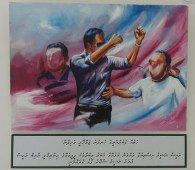The Human Rights Commission of the Maldives (HRCM) has said it would on Tuesday discuss the case of a 16 year-old girl who was on Sunday sentenced to house arrest and 100 lashes for fornication with a 29 year-old man, confirmed Vice President Ahmed Tholal.
Permanent Magistrate of Raa Atoll Hulhudhuhfaaru, Magistrate Abdul Samad Abdulla, sentenced the girl to eight months under house arrest, and for public flogging once she reaches the age of 18.
Meanwhile the man, who has been identified as Ahmed Rasheed, Finivaage, R. Angolhitheemu, has been sentenced to 10 years in jail on charges of sexual assault on a minor.
The sentencing has attracted international media attention and appeared in the UK’s Daily Mail newspaper.
President of the Hulhudhuhfaaru Island Council, Mohamed Zubair, told Minivan News today that the crime had occurred approximately two months ago. He said that the matter had been filed in court by the girl’s family.
Zubair said that although the girl was of school-age, she had stopped attending classes months ago.
An official of the Hulhudhuhfaaru Magistrate Court, Ali Rashid, spoke in length to Minivan News about the case on Tuesday.
“The girl has been sentenced to eight months house arrest. The charges for an adult who has committed fornication is a year’s house arrest, but since she is a minor, she can only be given two thirds of the regular sentence,” he explained.
Rashid said that the girl had been sentenced for fornication because she had confessed to it. The man, however, had denied the charges.
“The man said he hadn’t committed fornication, but he admitted to having hugged and done certain other things with the girl. This amounts to sexual assault of a minor under the law. That’s why he has got the minimum sentence possible under the relevant law, 10 years in jail,” Rashid explained.
The Magistrate Court confirmed that the man was now being kept in custody by relevant authorities.
The official of the Hulhudhuhfaaru Magistrate Court referred Minivan News to Article 25 of the act detailing special actions to be taken in cases of sexual offences against children (Act number: 12/2009).
Article 25 says: “Unless proven otherwise, it cannot be considered that a child between ages 13-18 had given consent to committing a sexual act. And unless proven otherwise, it will be considered that the sexual act was committed without the child’s consent.”
As the case now stands, two contradicting sentences have been given to persons involved in the same case.
While, as per the magistrate court, the man has been convicted of sexual assault, which translates into an act committed without the consent of the girl, the girl herself has been sentenced on the charges of having consensual sex outside of wedlock.
Private lawyer Mohamed Shafaz Wajeeh, agreed with this observation.
“I agree that there is a strong contradiction here. Also, the man has been sentenced under common law. The act he committed is criminalised under the existing laws, those drafted and passed through the parliament. The girl, on the other hand, has been sentenced under Sharia law, which is not specifically written down. There is a discrepancy in how men and women are sentenced. At times females face more difficulty denying charges of fornication. This, I believe is a structural issue which needs to be addressed.”
An official of the Ministry of Gender, Family and Human Rights, said that the ministry would not speak about specific cases.
Refusing to identify herself, she said, “If the girl has been sentenced for a crime, it’s either the court or JJU (Juvenile Justice Unit) that needs to be concerned. We will be concerned once the girl is flogged, but as far as I know, she hasn’t been flogged yet. We do not want to associate ourselves with a case that we are not involved in.”
Minister of Gender, Family and Human Rights, Dhiyana Saeed, was not responding to calls at the time of press.
In November 2011, UN HIgh Commissioner for Human Rights, Navi Pillay, speaking in parliament, raised concerns about the issue of flogging in the Maldives.
Speaking on the issue, Pillay said, “This practice constitutes one of the most inhumane and degrading forms of violence against women, and should have no place in the legal framework of a democratic country.”
Her statements and calls for discussion on the issue were met with outrage from the opposition and religious Adhaalath party, giving rise to protests and demonstrations. The Foreign Ministry itself dismissed the calls for discussion on the issue, stating: “There is nothing to debate about in a matter clearly stated in the religion of Islam. No one can argue with God.”
